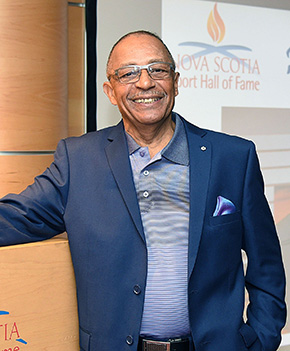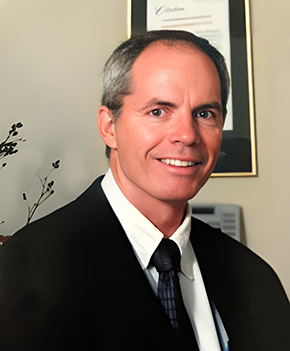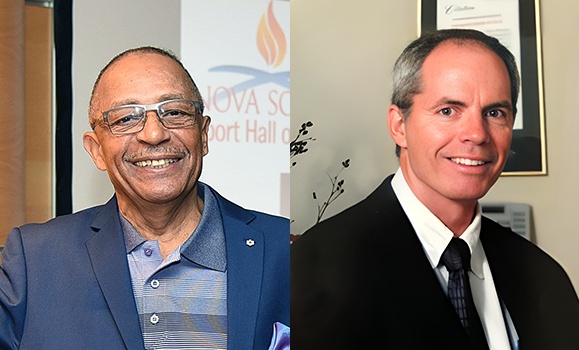Convocation ceremonies at ║┌┴¤│ď╣¤═°provide students with a chance to celebrate their years of hard work and achievements with friends, family and fellow students on campus. But they also offer an opportunity to celebrate the accomplishments of others through the bestowing of honorary degrees.┬á
This tradition, which stretches back 131 years at Dalhousie, continues this spring at Dal with the conferral of honorary degrees on two inspiring Canadians: Brad Barton, an African Nova Scotian educator and activist, and Dr. Edward Cain, a leader in emergency medicine. 
Spring 2023 Convocation ceremonies will be celebrated from May 29 to June 7 at the Alumni Theatre, Cumming Hall for the Faculty of Agriculture and at the ║┌┴¤│ď╣¤═°Arts Centre for all other Faculties. See specific dates and times for honorary degree ceremonies below.
Read about this year's honorary degree recipients below. Visit the Convocation website to learn more about Spring Convocation ceremonies.
Brad Barton
Educator, coach, and activist paving the way for African Nova Scotians
Tuesday, June 6 ÔÇö 9am (Livestream the Faculty of Arts and Social Sciences ceremony that day)
 Brad Barton knew he wanted to teach from the time he was a teenager and over the past 60 years few individuals can claim to have had a more positive impact on Nova ScotiaÔÇÖs school systems. From his own experience attending a segregated school to his work in classrooms and the provincial Department of Education, Mr. Barton has transformed the way our schools welcome and support African Nova Scotian learners and, indeed, students from all corners of this province.
Brad Barton knew he wanted to teach from the time he was a teenager and over the past 60 years few individuals can claim to have had a more positive impact on Nova ScotiaÔÇÖs school systems. From his own experience attending a segregated school to his work in classrooms and the provincial Department of Education, Mr. Barton has transformed the way our schools welcome and support African Nova Scotian learners and, indeed, students from all corners of this province.
Born and raised in Jordantown, Digby County, Mr. Barton began teaching at Allan W Evans/Nelson Whynder Elementary School in North Preston, fresh out of high school before even completing his teaching certification. In the years since, he has been a principal at the elementary, junior high and high school levels, and has held several senior administrative positions including Supervisor of Schools and Supervisor & Coordinator of Race Relations, Cross-cultural Education and Human Rights. In these roles and others, he has been instrumental in creating and leading initiatives to increase accessibility and improve outcomes for African Nova Scotian learners. He is a lifetime member of the Canadian Education Association and a past president of the National Council of Black Educators in Canada. 
Mr. Barton has left a lasting legacy in the sporting world as a volleyball coach, official and administrator. He officiated at two Olympic Games, one PanAm Games, three World Student Games and a World Championships. He is the first Black Canadian to become an internationally rated volleyball referee. Mr. Barton has received numerous awards, including the Queen Elizabeth II Diamond Jubilee Medal, the Order of Nova Scotia and induction into the Nova Scotia Sport Hall of Fame.
Dr. Edward Cain
Emergency physician, advocate, and researcher
Tuesday, May 30 ÔÇö 9am (Livestream the Faculty of Medicine ceremony that day)
 Dr. Edward Cain began his medical career in 1977 after graduating from the┬áUniversity of Ottawa and performing his residency at ║┌┴¤│ď╣¤═°. He dedicated his practice to working in emergency medicine, and consequently changed the lives of countless Nova Scotians in need of acute care through his medical practice, research and advocacy work.
Dr. Edward Cain began his medical career in 1977 after graduating from the┬áUniversity of Ottawa and performing his residency at ║┌┴¤│ď╣¤═°. He dedicated his practice to working in emergency medicine, and consequently changed the lives of countless Nova Scotians in need of acute care through his medical practice, research and advocacy work.
Among Dr. CainÔÇÖs numerous achievements are his contribution to the creation of the Paramedic Act, a piece of legislation that provided the groundwork and legal authority for paramedicine to become a self-regulating profession. His research into community paramedicine enabled paramedics to expand their scope of service to include primary health needs, and his research into how best to administer life-saving medicine to heart attack patients ÔÇťin the fieldÔÇŁ has helped save lives. He was also instrumental in the development of protocols that guide paramedical clinical practise in line with the latest evidence and research.
Dr. Cain was an emergency medicine physician at the QEII Health Sciences Centre for many years. He was an associate professor in DalhousieÔÇÖs Faculty of Medicine, has held roles in emergency health services for the Nova Scotia and New Brunswick governments, and has acted as a consultant for the paramedic program at the Justice Institute in British Columbia. He has been honoured with the Dr. Ron Stewart Award by the National Association of EMS Physicians and the Health Promotion Award by Doctors Nova Scotia.

